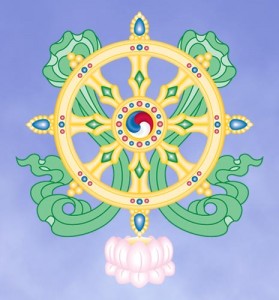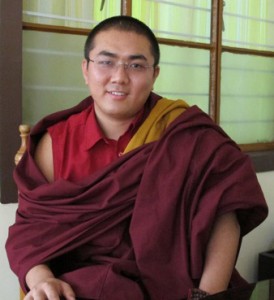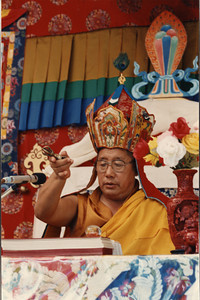An excerpt from a teaching called Viewing the Guru: The Seven Limb Puja by Jetsunma Ahkon Norbu Lhamo on October 18, 1995
We should be in the posture of requesting teachings. Think about that. Many students will have what they think is a nice relationship with the Guru. They think that they are on good speaking terms with the Guru. That tells you what’s going, doesn’t it? They think they are on good speaking terms with their teacher, and they think that, “Oh, I have a really good relationship with my teacher. I practice every day, and I come to teachings. And I pretty much keep up, and my teacher smiles at me and I give offerings and altogether I would say that things at the temple are going pretty well.” But the same student actually — and this is the case with literally every student that I have — the student does not come to the teacher and just throw open their hearts and their lives and say, “Take me and change me and fill my life with your blessing.” I have had students come and say that to me. “Oh Lama, make of me whatever I should be!” And their hair is nicely done, if you notice, when they do it. And then they pose a little. You know, they do it from their best side! “Okay, Lama? Watch me while I do this, mommy!” They do that with their mouth, but with their mind, with their hearts, not once, not ever. Not in any case have I had a student truly say to the Guru, “I request the nectar that you hold. I request what you have.” And the reason why is that we are still clinging to our ordinary samsaric experience, our ordinary samsaric lives. We say that we come to Dharma so that we can achieve realization, yet we don’t want to change. Now how is that going to happen? You come to Dharma so that you can change into a fully awakened realized being. But you don’t want to change. How’s that going to happen then? It is illogical! You can’t do that! It’s never going to happen!
Literally we find ourselves sitting at the feet of that miraculous appearance which somehow, magically, has appeared. Even through the thickness of our non-virtue, the thickness of our karma, yet still, like the sun penetrating these black storm clouds, somehow the teacher has appeared. And we know now from the teachings: this is the very face of the primordial wisdom nature. This is the very display of natural luminosity. This is the appearance, this is the magical, mystical appearance. And yet, we go away from it. We say, “Okay, you want to give me this fabulous teaching. Are you telling me that this is fabulous? Okay, I’m going to really listen up for this because I am a good girl.” And then, at the end of that, we close our minds, fold them up and go home.
If we thought of the Guru as an ordinary being, then we could say that the Guru only teaches two days a week. You can say that’s how it is. You can only hear the Guru’s words so often. Maybe you can make an extra effort. Maybe you could go back and hear some tapes. If the Guru were an ordinary sentient being, then perhaps that would be the only avenue open to you. But we have just learned that we are looking at our own primordial nature. We are looking into the face of our true nature. What are the limitations of that primordial wisdom nature? There are none. There are none whatsoever. So suppose, then, we were in the posture of understanding in a deep and profound way the correct view of how to see, how to know, how to experience devotional yoga. We see the Guru, we understand through correct vi
![zina-hands[1]](https://www.tibetanbuddhistaltar.org/wp-content/uploads/2010/08/zina-hands1-300x246.jpg)


